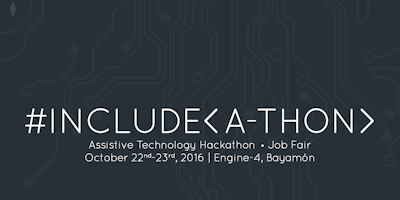#include<a-thon>: Assistive Technology
#include<girls> is a student driven non-profit organisation for women in STEM. Since one of #include girls main goals is to be inclusive of underrepresented communities in STEM, we have decided that for this year's Hackathon, our theme will revolve around Assistive Technology.
Assistive technology (AT) is any item, piece of equipment, software program, or product system that is used to increase, maintain, or improve the functional capabilities of people with disabilities. Assistive technology helps people who have difficulty speaking, seeing, hearing, learning, walking, among other things. If you would like to know more go to: (https://www.atia.org/at-resources/what-is-at/).
We are welcoming a diverse audience that is interested in technology and programming and would like to provide a comfortable space where they have access to mentors to work in their projects. However, in order to compete for our prizes, the projects MUST be related to Assistive Technology.
At our event, we will also be hosting a job fair where multiple companies will be accepting resumés and presenting their internships and job opportunities to the participants.
Prizes
1st, 2nd and 3rd prize will be given to the three bests projects revolving around AT.
Challenges
-
Accessibility to Control interfaces - Any type of software that can provide control of the usage of an electronic device, preferably a computer or laptop, to a person who might have more difficulty accessing these devices. Below are some examples of possible ideas for projects that fall under this category:
- Mouse emulation through a simple interruptor.
- Control the keyboard and mouse vía Morse Code
- Low–cost eye tracking mouse emulation
- Dwell clicking App (for Android)
- Computer-based control of video game console (voice recognition/Morse Code)
-
Sensory impairment - If one of the senses; sight, hearing, smell, touch, taste and spatial awareness, is no longer performing at its best. Below are some examples of possible ideas for projects that fall under this category:
- Voice recognition for closed caption of phone calls. - Closed captions refers to subtitles for every sound (even falling objects and onomatopoeias).
- Scanner App to identify checkmarks or LEDs next to a text. i.e Scantron sheet for the visually impaired.
- Recognition of ininteligible voice (discrete vocalizations)
- PERS App for desktop and or mobile
- PERS: Also know as a Medical Emergency Response System, it allows you to call for help in case of emergency by pushing a button. (https://www.consumer.ftc.gov/articles/0316-personal-emergency-response-systems-health-information-older-people). In this case, a software that provides this service to someone that might have difficulty accessing it with just a button
- Fall detection App with PERS
- Educational Hack - Create a software, web app or mobile app that helps create, conscience and educate the general public about any type of impairment.
- Entertainment Hack - Create a videogame or an app whose main audience is people whose disability makes it challenging to enjoy every day video games.
- i.e. A storytelling video game for people with physical impairment.
- Hardware Hack - Any of the challenges mentioned below accompanied by some type of hardware that facilities access.
Sponsor Challenges
- Oracle Challenge - To be selected by an Oracle representative.
- More sponsor challanges to be announced soon.
Rules
- Teams may include up to four members.
- All hacks must be built at #include by registered attendees.
- Remote participation is not allowed.
- A participant can belong to just one group.
- All student hackers must present their classes schedule of the current semester or trimester when registering. It can be presented printed or in a mobile device.
- Project contents must be general audience rated.
- Everyone must be identified at all times.
- Only hackers who are students at the time of the hackathon or who have left school within the current school year may compete for prizes.
- Any type of project can be presented, but only projects that revolve around Assistive Technology would be considered for prizes.
- Teams retain full ownership of their projects.
- Everyone must abide the MLH Code of Conduct.
- High school students can participate if they are 18 or older, or accompanied by a legal guardian throughout the event.
Judging Criteria
-
User Experience and presentation - Is the app simple, well-designed, and easy to use by non-technical users, providing easy access to relevant content?
-
Accessibility - Is the app usable by and useful to people with accessibility issues?
-
Sustainability - How likely is the app to survive beyond the Hackathon? Is this a viable app for final production and use? Is the idea promising enough to warrant sustained development, attention and collaboration with a Charity?

Location
Dates
to 23rd October 2016 - 04:00 PM
